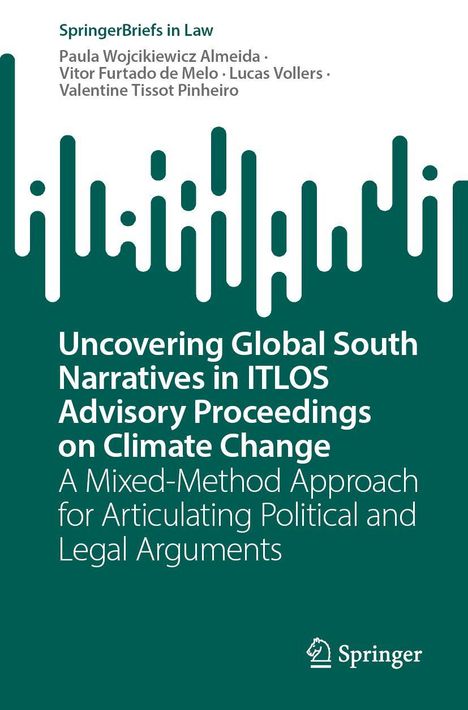Paula Wojcikiewicz Almeida: Uncovering Global South Narratives in ITLOS Advisory Proceedings on Climate Change, Kartoniert / Broschiert
Uncovering Global South Narratives in ITLOS Advisory Proceedings on Climate Change
- A Mixed-Method Approach for Articulating Political and Legal Arguments
(soweit verfügbar beim Lieferanten)
- Verlag:
- Springer, 11/2025
- Einband:
- Kartoniert / Broschiert
- Sprache:
- Englisch
- ISBN-13:
- 9783032084262
- Artikelnummer:
- 12451574
- Umfang:
- 96 Seiten
- Gewicht:
- 160 g
- Maße:
- 235 x 155 mm
- Stärke:
- 6 mm
- Erscheinungstermin:
- 4.11.2025
- Hinweis
-
Achtung: Artikel ist nicht in deutscher Sprache!
Klappentext
This book explores how Global South states shape narratives on climate change in international courts and tribunals. Specifically, it examines Global South narratives advanced before the ITLOS advisory proceedings on climate change, which provide a platform for states to frame their political positions and influence legal discourse on global issues.
Through the lens of international law and politics, this study investigates how narratives---rooted in historical experiences and contemporary vulnerabilities---serve as tools for articulating and influencing legal outcomes. While recognizing the diversity of voices within the Global South, the book explores whether a shared history of colonialism and varying degrees of climate vulnerability play a significant role in forming cohesive narratives in the ITLOS advisory proceedings on climate change.
The book develops a unique methodological approach, which goes beyond international law and deploys social science techniques to critically assess states' narratives before ICTs. It examines the Global South's submissions to the ITLOS alongside their political discourse at the UNFCCC's COPs 26, 27, and 28. This innovative method explores the intersection of law and politics and reveals how these states articulate their positions across different arenas, highlighting the strategic deployment of legal arguments within broader climate governance initiatives.
Offering a deep analysis of how narratives advanced before international courts and tribunals intersect with global climate politics and may shape decision-making processes, this book is essential for scholars, policymakers, and practitioners in international law, international relations, climate politics, and global governance.
Mehr von Paula Wojcikiew...
-
Paula Wojcikiewicz AlmeidaThe Normative and Regulatory Challenges for the Implementation of the European Deforestation-Free Regulation in Third Affected CountriesBuchAktueller Preis: EUR 142,37
-
Paula Wojcikiewicz AlmeidaThe Normative and Regulatory Challenges for the Implementation of the European Deforestation-Free Regulation in Third Affected CountriesBuchAktueller Preis: EUR 142,37



